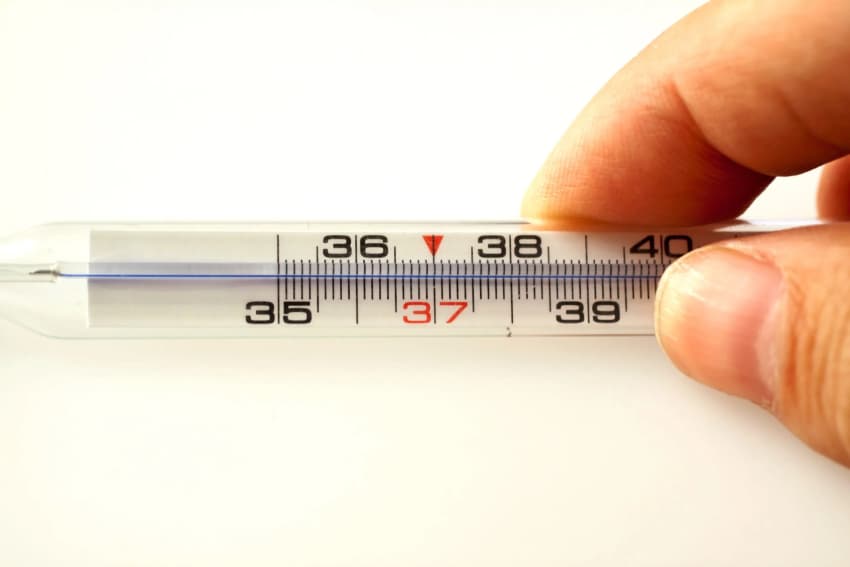
In the past few weeks, I've had some great questions about wisdom teeth (third molars) at my practice. So, for a few posts over the coming week or so, I'm going to try to give some great information about wisdom teeth. What are they? When do they come in? What problems come with wisdom tooth eruption? Is wisdom teeth removal necessary? Is removal risky?
But first, for today, let's find out if wisdom tooth eruption can cause a fever.
There are many theories as to why we have wisdom teeth if they commonly fail to erupt properly. Why would so many of us have these teeth if they're hard to reach and maintain and could possibly cause us serious health consequences?
Well, long ago, humans ate a diet high in plant materials and acidic meats. These diets may have lead to more wear-down of our teeth. As our tooth enamel wore down, teeth would become narrower. As this happened, teeth would drift to re-establish contact with their neighbours in front of them. This would lead to a shortening of the overall dental arch, increasing room available at the back of the mouth.
Specifically, this could have created more room for successful wisdom tooth eruption.
These days, our diet is very different and there is less overall wear on our teeth. We may be maintaining the full length of our dental arch and, in doing so, taking up some room that was once available for proper wisdom tooth eruption.

Early development of wisdom teeth can be seen on x-rays as early as 10-11 years of age. It takes at least a few years for the entire crown of the wisdom tooth to develop. By about 14 years of age, they begin to move toward the surface of the jawbone.
What do all of these changes feel like for your teenage child?
Well, teenagers will commonly notice their wisdom teeth starting to break through gum tissue between 16 - 22 years of age. Some teens really notice symptoms as these teeth erupt. Here are a few common symptoms that come with third molar eruption:

In small children, tooth eruption can bring about mild fever. We are talking about erupting baby teeth coming in during infancy. In contrast, it is a rarity that older children experience fever during eruption of adult teeth. If a fever occurs in conjunction with tooth eruption, it may indicate the presence of infection in the gums.
But, how does this infection come about?
Erupting wisdom teeth can cause formation of deep pockets at the back of the 2nd molars. Oftentimes, teens and adults are unable to properly access and clean these deep sites. As plaque, bacteria, and other contaminants collect in these deep pockets, infection can occur. One of the symptoms of severe infection is fever.
These types of infections are known as periodontal infections. Typically, a short course of antibiotics will resolve the infection and any resulting fever.
If infections around your wisdom teeth recur, it's generally an indication for having them removed.
So to answer today's question: Yes, fever can accompany wisdom tooth eruption. However, it is very rare and often a result of infection and not the eruption process itself.
If your wisdom teeth become impacted or "stuck" on their path into the mouth, they'll stay in a partially erupted position long-term. This often means that the tooth is halfway into the mouth with a portion of the tooth still submerged under the gums.
Why is this a potential problem?
Well, harmful bacteria and other irritants in your saliva can leak under the gums and into deep pockets around your impacted wisdom tooth. This can lead to a gum infection or periodontal abscess.
In another scenario, the partially erupted wisdom tooth can rest on the 2nd molar in front of it. This contact point is often abnormally low and often submerged well under the gums. This contact area is impossible to reach with floss or your tooth brush and, oftentimes, a cavity on the back wall of the 2nd molar develops.
If your Kitchener Dentist sees signs of potential decay on teeth adjacent to your third molars, they'll typically recommend wisdom tooth extraction.
Most often, pain and other symptoms related to wisdom teeth are related to normal eruption. Call your Kitchener Family Dentist to arrange a consult appointment.
On occasion, patients experience stinging gums, swelling or a strange taste or odour in the mouth. This often signals a wisdom tooth infection. Again, call your Kitchener Dentist to arrange an emergency examination. Your Dentist may recommend wisdom tooth extraction or they may decide that you should give the teeth more time to erupt into a proper position.
In the meantime, rinse with salt water frequently and attempt to floss the area. Waterpiks work nicely for flushing deep pockets and removing contaminants that can lead to infection.
Thanks for reading today!
If you would like to discuss wisdom teeth removal, please give us a call at (519) 576-8160 or request a consult with me here.
This article is intended to promote understanding of and knowledge about general oral health topics. It is not intended to be a substitute for professional advice, diagnosis or treatment. Always seek the advice of your Kitchener Dentist or other qualified healthcare provider with any questions you may have regarding a dental condition or treatment.
Services
Routine Dentistry & Tooth Repair
Oral Surgery & Tooth Removal
Prosthetic Dentistry & Tooth Replacement
Protective/Preventive Services
Teeth Whitening
Schedule an Appointment Now
